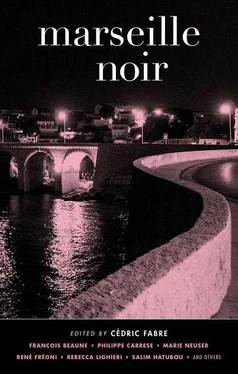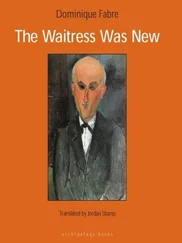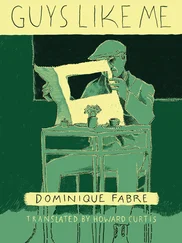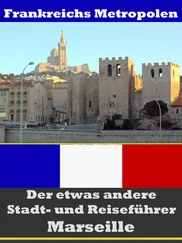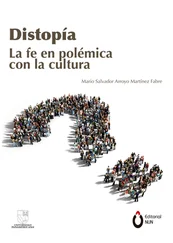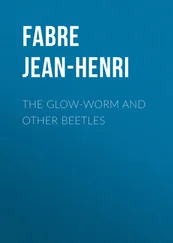Cédric Fabre - Marseille Noir
Здесь есть возможность читать онлайн «Cédric Fabre - Marseille Noir» весь текст электронной книги совершенно бесплатно (целиком полную версию без сокращений). В некоторых случаях можно слушать аудио, скачать через торрент в формате fb2 и присутствует краткое содержание. Год выпуска: 2015, Издательство: akashic books, Жанр: Крутой детектив, на английском языке. Описание произведения, (предисловие) а так же отзывы посетителей доступны на портале библиотеки ЛибКат.
- Название:Marseille Noir
- Автор:
- Издательство:akashic books
- Жанр:
- Год:2015
- ISBN:нет данных
- Рейтинг книги:5 / 5. Голосов: 1
-
Избранное:Добавить в избранное
- Отзывы:
-
Ваша оценка:
- 100
- 1
- 2
- 3
- 4
- 5
Marseille Noir: краткое содержание, описание и аннотация
Предлагаем к чтению аннотацию, описание, краткое содержание или предисловие (зависит от того, что написал сам автор книги «Marseille Noir»). Если вы не нашли необходимую информацию о книге — напишите в комментариях, мы постараемся отыскать её.
Marseille Noir — читать онлайн бесплатно полную книгу (весь текст) целиком
Ниже представлен текст книги, разбитый по страницам. Система сохранения места последней прочитанной страницы, позволяет с удобством читать онлайн бесплатно книгу «Marseille Noir», без необходимости каждый раз заново искать на чём Вы остановились. Поставьте закладку, и сможете в любой момент перейти на страницу, на которой закончили чтение.
Интервал:
Закладка:
A man came up to Kevin and threw the daily paper on the table. He kept walking without stopping and turned left onto rue du Bon Pasteur. Kevin pretended to wait a moment before casting a distracted glance at the headline, quickly deciphering the address scribbled on the corner of the page. He paid for his drink and tried to make his way through the crowded sidewalks. He asked for directions from an old man sitting on a stool. The man stared at him and said: “Straight ahead on the other side of the street, son, but if I were you, I’d turn around and go back. I can see the ogress Aïcha Khandicha in her hairy clogs, holding you by the hand. You’d better go back home.”
Kevin shook his head as he crossed the street, leaving the market behind him. The city had its professional lice-pickers. A galloping gangrene of illicit border crossers, of street people, of drunken bums, starving runaways, old men in furnished rooms, and families pushing shopping carts that swayed under the debris. These dark creatures roamed through the streets with their backpacks, armed with a twisted metal clothes hanger: the garbage reaper these men and women use to poke around in the heart of the trash. Crooks beware! Garbage was divided equitably by sector. People were on stir-duty every other night, airing out their fair share of refuse. By dawn, the filthy display would attract a whole crowd of sinister-looking characters along with the many shoppers. Hoods would come to sell off the product of their robberies, fighting over the territory occupied by the dirty kettles, broken cups, and scratched vinyl records. A free-for-all where fits of anger most often degenerated into knifings, under the frightened eyes of the garbage-pickers. It was like an open manure hole at the gates of the city. The rotting face of a horrible world displayed in broad daylight. The frightful foreboding of the coming end. People with no rights, less-than-nothings appropriating the scraps that had fallen off the tables. Folks put up with the wretched of the earth, fed by the leftovers they had turned down. But they raged against the ones in the garbage trade, for they attracted all kinds of shady dealings. Terror loosened tongues. The sack of the city was organized from this sinister spot where criminals mixed with street peddlers. Among the latter, there were a handful of runaways from the other bank of the Mediterranean. Not content with robbing open-air dumpsters, these wretched wetbacks invited the worst villains to join the party. Pressure cookers sold without lids, chipped coffee cups, and heaps of old shoes lay next to the contents of recently stolen handbags.
Visitors would enter the city and bypass place Jules Guesde, that crossroads of desolation. They would leave it the same way, taking with them the spectacle of those men and women in charge of cleaning out our garbage cans. Some inhabitants of the city would gladly go cast stones at the devils on place Jules Guesde, so much did they fear being confused with these seekers of rancid crap. They threatened to beat them up. Officials made a lot of noise denouncing depravity and murder.
“Roadblock, roadblock,” men were whispering, caught by surprise at the sudden arrival of the cops, panting as they fled down boulevard des Dames dominated by the glass façade of the Conseil Régional. The disorderly troupe was retreating toward rue du Bon Pasteur, a little commercial street so narrow that the disparate stampede bumped against passersby and knocked over stalls in the bazaar before scattering into the adjacent streets. The exhausted runners huddled in the doorways without dropping their stuff, loaded to hilt like a caravan of mules in the Atlas Mountains heading for the souk. Their loads stowed in total disarray, as they had to pack in a rush. The bundles were coming undone, revealing the black bottoms of pots and pans and vomiting a flow of old, sodden rags. Moldy clothes with sleeves frayed at the wrist swept over the asphalt like the arms of hanged men cut down in haste.
Utterly bewildered, Kevin escaped from the bedlam and left to get the package of powder. He had to deliver the drugs to some other European city. They would only tell him where when he was just about to leave. Tomorrow, he told himself, I’ll get their message and I can finally get the hell out of this cemetery under the sun.
He walked back to the hotel, threw himself on the bed, and fell asleep fully dressed. At nightfall, Maria joined him in his room. They drank beer, laughing like children. She began to dance around the room with her long hair undone, after turning the music up full blast. Then she threw herself on the bed and wrapped her naked thighs around the young man’s neck. Kevin was groaning under Maria’s greedy little bites. Her voracious tongue was licking his penis and thrusting it deep into her mouth, while strangling the base of it in a fist. The pleasure was so intense that he held out his hand and grabbed the girl’s throat. She pushed him away and placed herself on top of him. He exploded in a whirlwind. When he woke up the next morning, his room had been ransacked from top to bottom. The packet of powder had disappeared too.
Consumed with rage, he rushed down the stairs, went out the entrance like a gust of wind, and ran across boulevard d’Athènes. No one on the street paid any attention to him. Men were smoking, sitting at tables on the sidewalks. He took rue Thubaneau, dashed onto rue du Baignoir, and stumbled, panting, over a pile of blankets for sale on the sidewalk in front of the entrance to a bazaar. The shopkeeper cursed him with every word in the book. Kevin ran up rue des Petites Maries. He knew he was a dead man. Abou Salem would send his pack of killers after him. That man had zero tolerance for failure.
Kevin’s phone rang. He ran his eyes madly over the text displayed on the screen: Berlin, Ylmaz Grocery. 22409. He was living on borrowed time now. He would not go to Berlin. His life was ending right here, in this city of white hills. He made a split-second decision: he wouldn’t wait for Abou Salem’s thugs to pick him up in some alley. I won’t let myself be Kalashed like a canary at the Foire du Trône, the young man thought. He would kill himself on Plage du Prophète. No need to explain. Smiling, Kevin imagined the selfie that would make. He clenched his fist on the box cutter in his pocket and walked toward the staircase going up to the Saint-Charles metro station.
THE WAREHOUSE FOR PEOPLE FROM BEFORE
by SALIM HATUBOU
La Solidarité
For my Comorian friend,
the poet-gendarme Mab Elhad
La Solidarité, a housing project in the North End of Marseille, is like a gap-toothed woman. Only a few buildings are still standing. Like a powerful cyclone, a program of the Agence Nationale pour la Rénovation Urbaine reduced some high-rises to dust and rubble while promising the tenants new apartments that must have needed a coal train to build, considering how long they’ve taken to come. This project is mine. I was born there. I grew up there. I live there.
This morning, from the tenth floor of building L-11, I look out on the stretch of villas that cover the hills as I enjoy my coffee. When I was a boy, I used to build cardboard cabins on those hills with my friends, but all that is far away, for today developers have put in private houses and built a wall to separate the new neighborhood from our apartment buildings.
I’m Sambafoum. Lieutenant Sambafoum. My parents left the Comoros archipelago to live in the Phocaean city. In kindergarten at La Solidarité or in the afterschool program, when we played cops-and-robbers, they always gave me the role of the robber, and even when we switched roles I remained the robber, despite my protests. So when I grew up, I became a cop in the game of life. I became a cop. My father was a construction worker. He died while working on the site of the metro between Sainte-Marguerite and Bougainville. At dawn one February, when far right groups murdered a kid of Comorian origin in cold blood, my mother packed her things in a suitcase. When the far right won the elections in three cities in the south, my mother put on her jacket. When the far right took the fourth city in the south, my mother put on her shoes. And when the far right made it to the second round of the presidential elections one April evening, my mother split, destination: her native archipelago.
Читать дальшеИнтервал:
Закладка:
Похожие книги на «Marseille Noir»
Представляем Вашему вниманию похожие книги на «Marseille Noir» списком для выбора. Мы отобрали схожую по названию и смыслу литературу в надежде предоставить читателям больше вариантов отыскать новые, интересные, ещё непрочитанные произведения.
Обсуждение, отзывы о книге «Marseille Noir» и просто собственные мнения читателей. Оставьте ваши комментарии, напишите, что Вы думаете о произведении, его смысле или главных героях. Укажите что конкретно понравилось, а что нет, и почему Вы так считаете.
